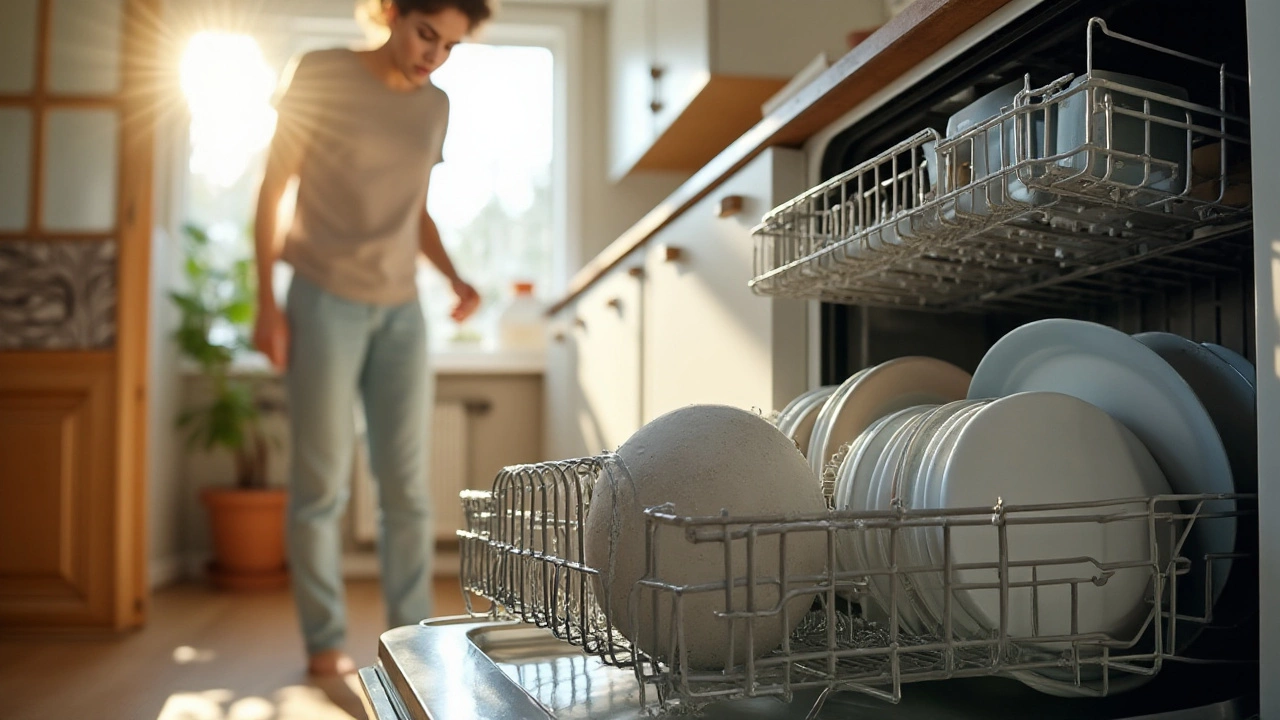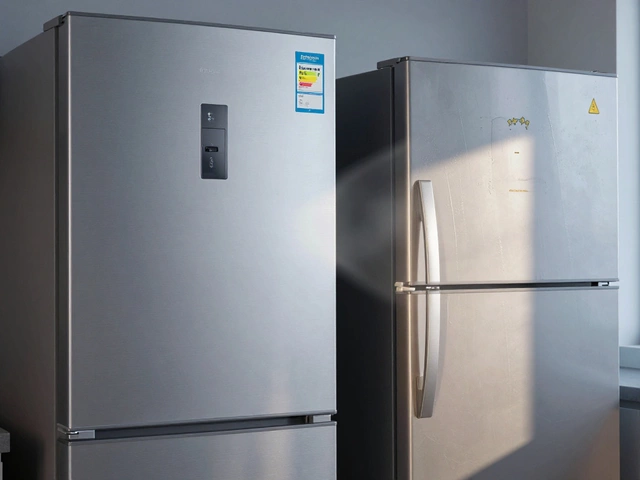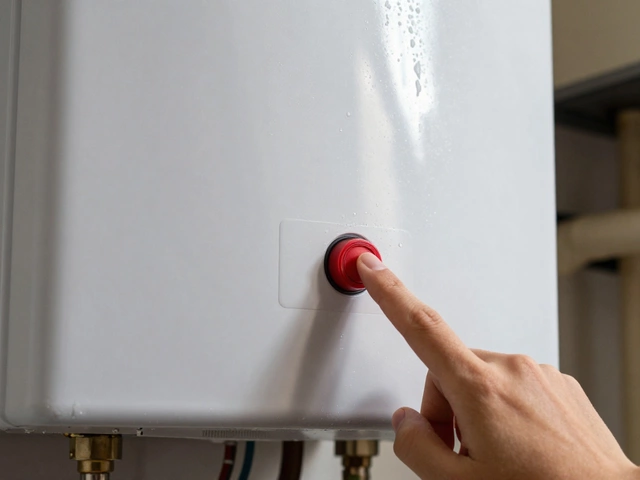So, your four-year-old dishwasher has suddenly decided to make life complicated. Naturally, you're left wondering – should you fix it or toss it for a new model? Before you make a hasty decision, let's dive into some essential factors you need to weigh.
First off, let's talk about the problems typical of a four-year-old dishwasher. It's not uncommon to experience issues like poor draining, odd noises, or maybe dishes aren't coming out as sparkly as they once did. Each problem comes with its own repair price tag, and considering that, helps you decide if it's repair-worthy.
Now, here's a tip: if the repair estimate approaches 50% of buying a new dishwasher, give serious thought to investing in a new one. After all, repair costs can add up, and it’s sometimes more economical to upgrade.
- Common Problems with 4-Year-Old Dishwashers
- Cost of Repairs vs. Buying New
- Checking Warranty and Repair History
- DIY Fixes and Maintenance Tips
- When to Call a Professional
Common Problems with 4-Year-Old Dishwashers
When your dishwasher hits the four-year mark, it's like reaching mid-life crisis for some machines. Not too old, but not new either, a few common problems may begin to pop up. Recognizing these issues early can save you from future headaches and costly repairs.
Poor Cleaning Performance
One of the most frequent complaints with dishwashers at this age is that dishes don’t emerge as clean as they should. Check for clogged spray arms or a blocked filter. It might just need a thorough cleaning.
Strange Noises
Hear any odd grinding or rattling sounds? This could be a sign that debris is stuck in the drain pump or that the circulation pump motor is failing. Regular maintenance can help, but if the noise persists, a professional inspection might be necessary.
Leaking Water
Finding a puddle by your dishwasher is never a good sign. Leaks can be due to a worn-out door seal or loose connections. Ensure those seals are intact and screws are tightened to prevent future leaks.
Draining Issues
If water is remaining in the bottom of your dishwasher after a cycle, you might be facing drainage problems. This can be caused by a blocked filter, or drain hose. Cleaning out the filter regularly can keep this problem at bay.
| Problem | Possible Cause | Solution |
|---|---|---|
| Poor Cleaning | Clogged Spray Arms | Clean Spray Arms |
| Strange Noises | Debris in Drain Pump | Check Drain Pump |
| Leaking | Worn Door Seal | Replace Door Seal |
| Poor Draining | Blocked Filter | Clean Filter |
Remember, these problems aren't necessarily signs you need an entirely new machine. Many times, with a little know-how and elbow grease, a trusty repair can breathe life back into your appliance.
Cost of Repairs vs. Buying New
When your trusty dishwasher starts causing trouble, you’re faced with a big question: is it cheaper to repair it, or should you spring for a new one? To help make sense of this, let's break down the costs.
A typical dishwasher repair can range anywhere from NZD 150 to NZD 600, depending on what's broken. If your dishwasher needs a new motor, you're looking at the higher end of the spectrum. On the other hand, simple fixes like unclogging a hose might just cost you the basic service fee.
Consider the Repair Cost
Before you rush into repairs, here's a simple rule of thumb: if the repair costs tickle half the price of a new dishwasher, replacing it might be the smarter choice. Why? Because even if you pour money into repairs now, other parts might start failing soon after.
New Dishwasher Price Tag
The average cost for a new dishwasher in New Zealand sits around NZD 800 to NZD 1500, with high-end models reaching up to NZD 2000. Yes, it's a chunk of change, but think about what you'll get—improved efficiency, better features, and maybe a sleek design that jazzes up your kitchen.
Energy Efficiency and Savings
Before making the call, consider the energy savings. Modern dishwashers are often more energy-efficient, and that could knock a few bucks off your power bill over time. To see if your model is pulling its weight, look at the energy rating sticker. A lower energy rating means higher running costs.
| Repair/Replacement | Estimated Cost (NZD) |
|---|---|
| Basic Repair | 150 - 300 |
| Major Repair (e.g., new motor) | 400 - 600 |
| New Dishwasher | 800 - 1500 |
So, whether you decide to fix that stubborn appliance or treat yourself to something new, base your choice on repair costs, long-term savings, and maybe a splash of kitchen aesthetics.

Checking Warranty and Repair History
Before you make any decisions about your dishwasher repair, it's vital to see where you stand with your warranty. Dishwashers typically come with a one to two-year warranty, but extended warranty options might cover your appliance up to five years. So grab that paperwork or check the manufacturer’s website to see if your dishwasher is still under warranty. A valid warranty can save you big bucks by covering repair costs or even replacing the appliance altogether.
Need to know if you've already put too much money into repairs? Go through the repair history. If you've had multiple fixes in the last year, especially costing more than $100 each time, it might be time to consider other options rather than funneling cash into what feels like a money pit.
Appliance repair experts often suggest comparing the cost of repeated repairs to the price of a new dishwasher. If your repair expenses are high, and you're frequently calling technicians, a new appliance is probably a better investment in the long run.
Practical Steps to Take
- Find your purchase receipt or any documentation regarding your extended warranty. If you can't locate it, contact the retailer or manufacturer for a copy.
- Collect all repair receipts and jot down any issues you've faced. Tracking these can give you a clear picture of what’s going wrong and how often.
- Run a quick check on the brand’s reliability. Some brands have well-earned reputations for requiring fewer repairs, which can be a good indicator of future performance.
By understanding both your warranty and repair history, you weigh your options wisely and hopefully keep your kitchen running smoothly without unnecessary frustration or extra expense.
DIY Fixes and Maintenance Tips
Even if you're not the handiest person around, there are some easy dishwasher repair tips you can try before calling in a pro. You might be surprised at how some quick fixes can extend your machine's lifespan.
Troubleshooting Drainage Issues
First things first, check if your dishwasher isn't draining properly. A clog in the drain is often the culprit.
- Remove the bottom rack and inspect the drain area. Any debris? Clear it out.
- Check the drain hose for kinks or clogs. Sometimes, simply straightening the hose solves the issue.
- If your dishwasher still isn't draining, try running a cycle with a mix of vinegar and baking soda. This can help clear minor clogs.
Improving Cleaning Performance
Is your dishwasher not cleaning as it used to? Let's tweak a few things.
- Examine the spray arms. They can get clogged with food particles. Take them off and rinse under hot water to remove any blockages.
- Use a quality dishwasher cleaner monthly. This helps break down lime and mineral build-up.
- Don't overload the machine. While tempting, cramming in more dishes can lead to poor cleaning results.
Dealing with Strange Noises
If your dishwasher is suddenly noisy, it might be time for a bit of maintenance.
- Check for loose items like silverware dropped into the bottom of the tub.
- The dishwasher's pump can be the source of noise. If you're unsure how to check, consult your manual. Sometimes, a simple cleaning might fix it.
Following these DIY maintenance tips might just save you the hassle (and cost) of professional repairs. Regular care can keep your dishwasher alive and kicking for years beyond its warranty.

When to Call a Professional
Sometimes, deciding when to throw in the towel and call for help on that dishwasher repair is a no-brainer. But other times, it’s a bit muddier. So, how do you know if it’s time to reach out to the pros?
Electrical Issues and Water Leaks
If your dishwasher is tripping the circuit breaker or there’s a water leak, it’s best to leave these to the pros. Electrical problems pose a safety hazard, and leaks can cause significant damage that needs a precise touch to handle correctly. A professional appliance repair technician will know exactly how to tackle these safely.
Complex Mechanical Failures
Let's face it, unless you enjoy living dangerously, tackling that stubborn motor issue or a broken internal component probably isn’t a good idea. These parts can be costly and tricky to replace without the right tools and expertise. Plus, a botched job could make things worse, leading to more expensive repairs in the future.
Warranty Coverage Insight
Another key reason to call a professional is if your dishwasher is still under warranty. Warranties can be a lifesaver, covering repairs if you use a recommended service provider. Not using an authorized technician could void your warranty, leading to out-of-pocket expenses you might not be ready for.
The Cost Factor
Professional repairs might seem pricey upfront, but sometimes they prevent larger problems down the road. Fix dishwasher concerns might look simple but can turn into bigger complications. An experienced tech can diagnose hidden issues and fix them right out of the gate, saving you headaches and money in the long run.
Here's a quick guide to help make the call:
- You're facing electrical or water-related issues.
- You aren’t sure what the problem is.
- The repair involves complicated mechanical parts.
- Your appliance is still under warranty.
Using a professional for these situations saves time, energy, and lets you get back to dishes that come out clean, not crusty. Sometimes it's worth it to pay for peace of mind.





